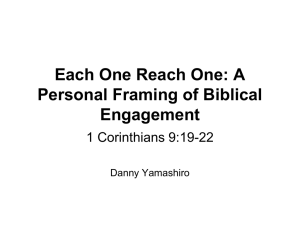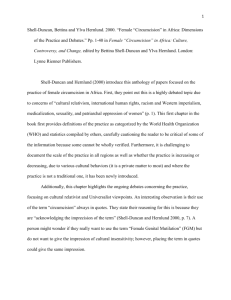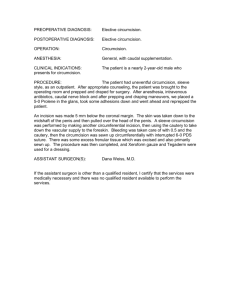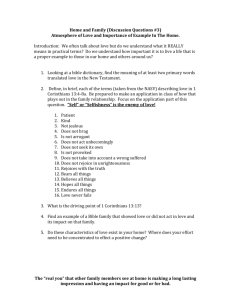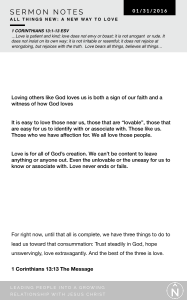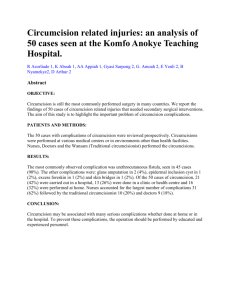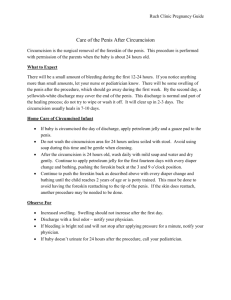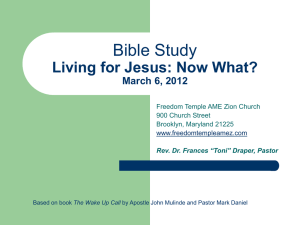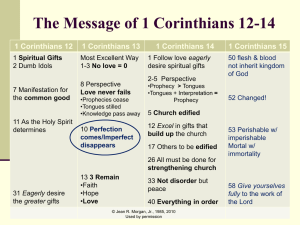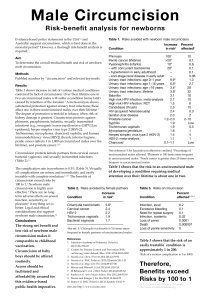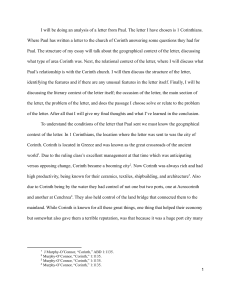FrankC - WordPress.com
advertisement
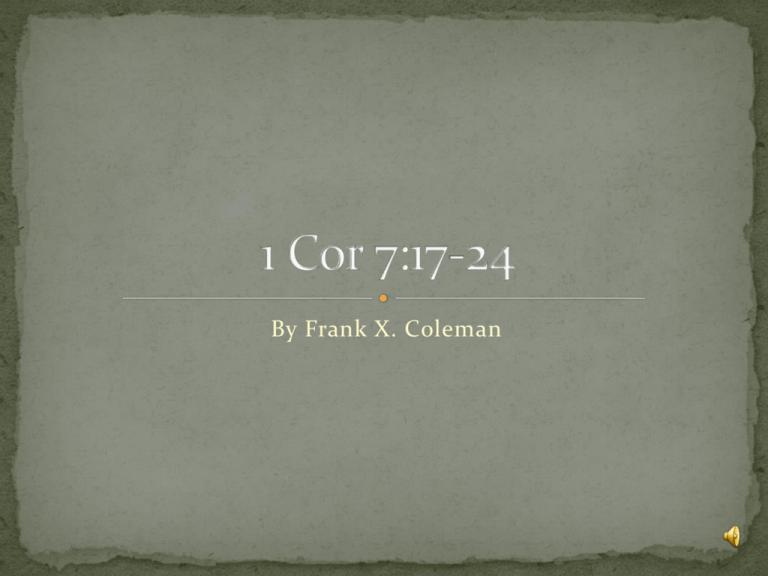
By Frank X. Coleman “17Only, everyone should live as the Lord has assigned, just as God called each one. I give this order in all the churches. 18Was someone called after he had been circumcised? He should not try to undo his circumcision. Was an uncircumcised person called? He should not be circumcised. 19Circumcision means nothing, and uncircumcision means nothing; what matters is keeping God’s commandments. 20Everyone should remain in the state in which he was called. 21Were you a slave when you were called? Do not be concerned but, even if you can gain your freedom, make the most of it. 22For the slave called in the Lord is a freed person in the Lord, just as the free person who has been called is a slave of Christ. 23You have been purchased at a price. Do not become slaves to human beings. 24Brothers, everyone should continue before God in the state in which he was called.” (1Cor 7:17-24) Corinth was a Roman city that was famous for its successes in philosophy, intellect, and wealth. However, it was infamous for its iniquities and debauchery. Paul traveled there and lived there for sometime, establishing a church. He insisted on sustaining himself financially so that the wealthy would not try to buy their way into righteousness. After a year and a half there he left for Ephesus. Eventually, the ways of other civilians of Corinth tainted the morals of the Church there. The church in Corinth wrote to Paul asking him for guidance in issues that they faced such as idolatry and divorce but for this project the main ones to be focused on are the themes of slavery, circumcision, and other general problems with conversion. About two year after Paul had left Corinth, things were falling apart so they sent him a letter in Ephesus discussing their issues. It is believed by different sources that Paul had written the Corinthians a letter previous to receiving theirs, but that letter is no longer in existence so its contents remain unknown. Paul offered them solutions to their problems. Corinthians tried to justify divorce if one of the two in the marriage was a believer while the other wasn’t. Paul said that God wouldn’t want divorce so that instead the one who believed should try to do what he can to convert the other. Another issue was idolatry. Paul addressed their problem of people eating of the food that had been sacrificed to idols by simply reminding them that they should not be worshipping these idols at all. The issues that 1Cor 7:17-24 touch upon however, are ones of circumcision and slavery. Paul says that the purpose of being called was not to be circumcised and follow all Jewish Laws, but as long as they followed the commandments they had already started to fulfill their duty as Christian. Even though Paul’s point is that everyone should remain as they were when they were called, if their circumstance was slavery and the opportunity arose to gain their freedom, they should take it because they will be freed in Christ anyway. The problem of circumcision was that the Corinthians were Gentiles, which is synonymous with uncircumcised. The Corinthians were unsure if they had to be circumcised to be Christians so Paul told them they need not be circumcised as long as they followed the Commandments. Sociological sources tell us that Paul’s contemporary Corinthians were worried about social status in a huge way. So circumcision was going to be a symbol of their social stance. Obviously, the Prep community does not have to deal with issues such as slavery and circumcision, but it’s what’s behind those themes. It is not that one must change to be called, but one must be called to be changed. Prep parallels Christianity in the way that you do not have to change your life if the opportunity is granted for you to be a member of the institution, but once you are one, you’re life will change tremendously. It is not required for a young man to walk into prep on his first day of freshman year knowing everything that would’ve taken 4 years for many others to learn. Instead, a student comes in the same he was in eighth grade and leaves as a whole new, hopefully better, man. That same student who on his first day came in with maybe a handful of kids that he called “friends” left the school on graduation becoming a part of a network of thousands of men who are called, simply, Prep Brothers. So as it was back then, people would lead their lives as normal until it arrived that they were called to Christianity. Paul insists that you mustn’t change yourself to be a Christian, but being a Christian will change you. The Pauline equivalent to the “graduation” in that time would be the apocalypse coming and all of the righteous would be a part of something larger, The Kingdom of God. Paul: A Very Short Introduction by E.P. Sanders Paul, Apostle of God’s Glory in Christ: A Pauline Theology by Thomas R. Schreiner 1 Corinthians by Richard A. Horsley A Brief Introduction to the New Testament by Bart D. Ehrman http://upload.wikimedia.org/wikipedia/commons/5/5c/P46.jpg http://www.crivoice.org/phototour/photoarchive/corinthstreet_small.jp g http://media.nj.com/hudsoncountynow_impact/photo/st-peters-prephigh-schooljpg-526e7a2c05c26ad3_large.jpg http://upload.wikimedia.org/wikipedia/en/6/6d/SaintPetersPrep_Embl em.png https://encryptedtbn0.gstatic.com/images?q=tbn:ANd9GcTX53HBz5oq6qxcAikHqso2W9VI_RkYEqjGphdJq7YppNf8Ax4zw https://fbcdn-profile-a.akamaihd.net/hprofile-akash3/373553_133774240034397_496914572_n.jpg
